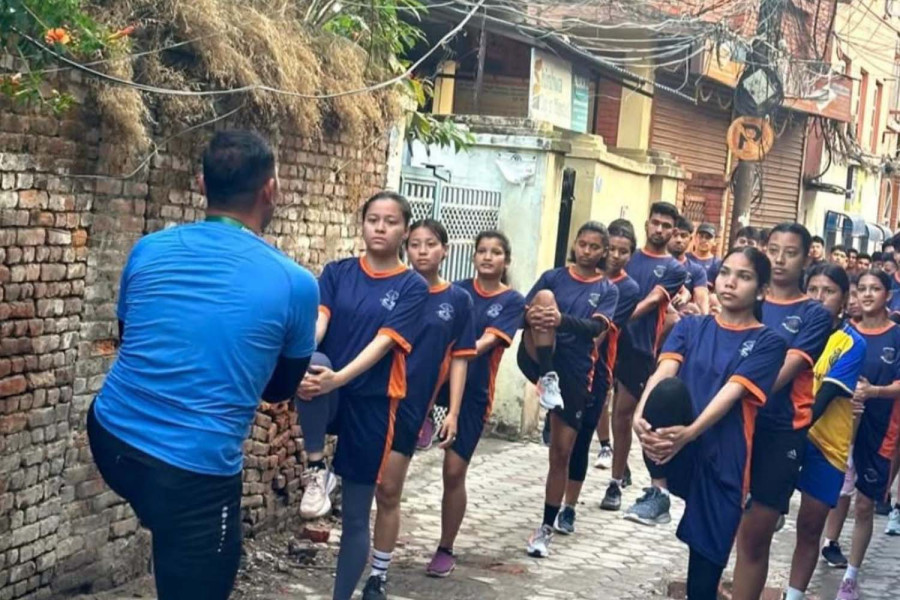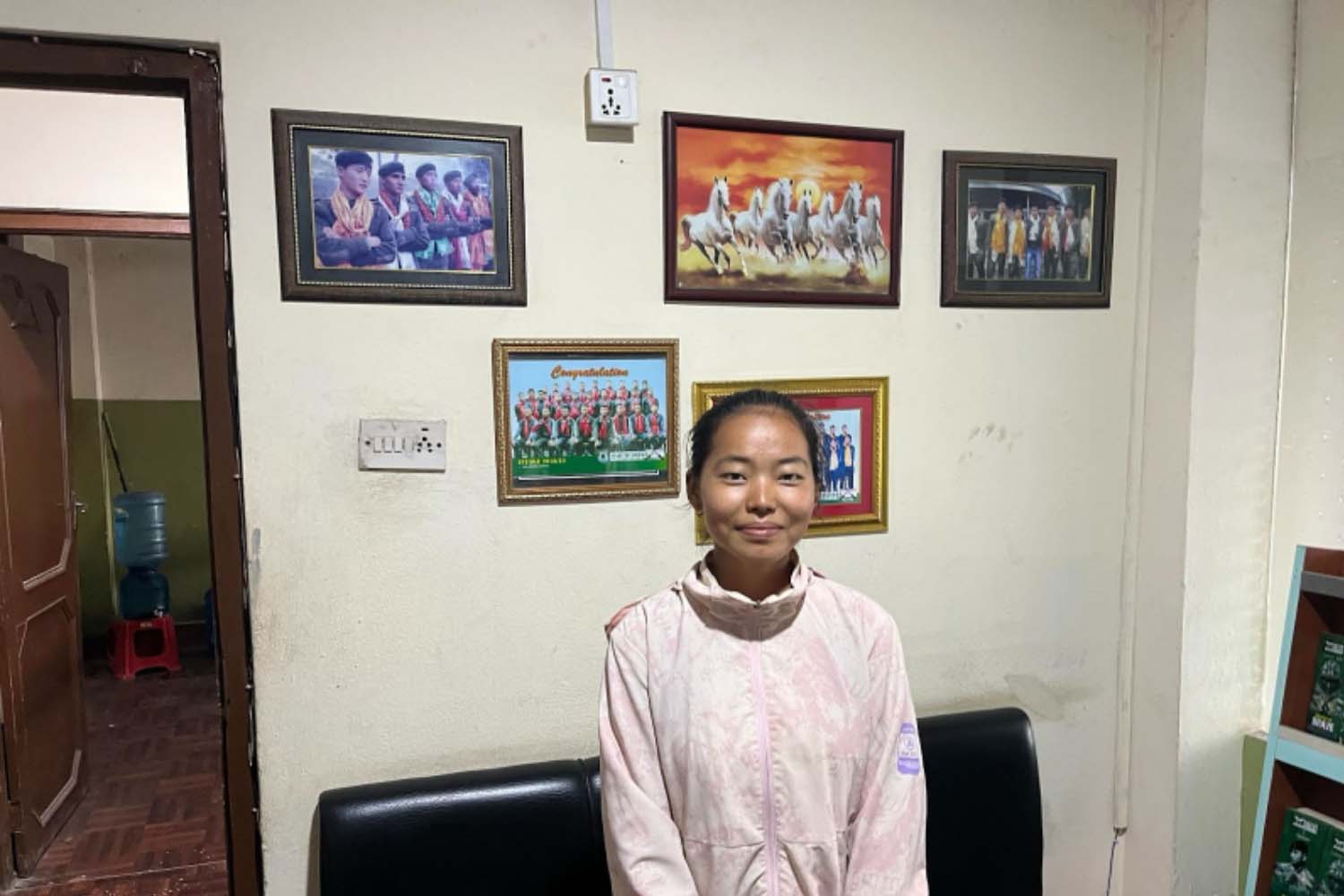Valley
Nepali women aspire—and train—to join British Army. Kathmandu still says no
Without Nepal’s decision, the British can’t take in female Gurkhas to serve them. Many doubt family’s permission for these young women to serve in a foreign army will come easy either.
Ellie Davis
Last year, the Salute Gorkha Training Center sent five young men in training to join the British Army. Seventeen-year-old Kanchan Thapa Magar recently also joined the Centre as the only girl out of 70 students. But unlike her male peers, she doesn’t have the option of training to join the British Army.
“I think boys and girls are the same,” she said. “I want to go to other places, but I can’t go.”
Around 12,000 young men in Nepal try to become Gurkha soldiers every year, but only 200 to 400 are selected, according to the Center’s CEO Rahul Pandey. Their training is rigorous. Unlike training for the Nepal Army or the Nepal Police Force, for which potential soldiers have to meet minimum physical standards—such as being able to do 12 pushups for male Nepal Army recruits—trainees hoping to become Gurkhas take physical tests in which they push themselves as hard as possible to prove themselves and earn one of the few spots in the British Army.
Back in 2018, the UK Defence Ministry announced that the Gurkha Brigade would start recruiting Nepali women, but in 2019 parliament blocked women’s recruitment. British Defense Minister Luke Pollard recently reiterated the UK’s interest in recruiting female Gurkha soldiers, but the Nepal government has yet to answer his call.
“Minister Pollard’s statement reflects a longstanding British Government aspiration to extend the opportunity to join the Gurkhas to Nepali women,” the British Embassy wrote in a statement to the Post. “Such a change would need to be made in conjunction with the Government of Nepal, with whom we are closely engaged.”
The Nepal Ministry of Foreign Affairs would not comment on its policy regarding female Gurkha recruitment.
Pandey remembers women’s excitement at the possibility of joining the British Army. At the time, he was training 45 women who hoped to have a chance of being selected to join the British Gurkhas starting in 2020. With their plans blocked, most of these women went on to join the Nepal Army or pursue higher education in other fields.
The House of Representatives Committee on International Relations made the decision to block female Gurkha recruitment on February 15, 2019, resolving to “immediately stop the recruitment of Nepali women into the British Army without the consent of the Government of Nepal,” according to Parliament records.

The records do not indicate why the committee chose not to allow women to participate in Gurkha recruitment. Any future changes in government policy on female Gurkhas must come from the Committee on International Relations, according to Under-secretary Sharada Bhandari. “It is the sole authority of the parliamentary committee to direct the Government in this issue,” she said, though she did not specify when the issue might come up before the committee again.
Pandey thinks that the women who were training to be Gurkhas missed out on a valuable opportunity. “It is a good secure governmental and long-term job, it could drastically change women’s lives,” he said. “[Allowing female Gurkhas] would be an equal opportunity in action, not just words.”
“If women can study abroad, why not work for the British Army?” he asked.
In Nepal, young women see joining the military as a viable career path. Eighteen-year-old Elisa Bastola is currently training at Dima Academy and she hopes to become a pilot in the Nepal Army. “The army gives a good opportunity for independence,” she said. “Women can live the life they want, and earning is in their hands.”
For the women currently training to join the Nepal Army, not having the same options of going into military work abroad is frustrating. Nineteen-year-old Simran Maharjan is also currently training to join the Nepal Army, and if she makes it, she said she would be very proud to work for her country. Still, if she had the equal opportunity to train to be a British Gurkha soldier, she would take it. “If there was a chance, then of course we would go,” she said.
Nineteen-year-old Khusi Maya Thapa recently passed her exam to become eligible for recruitment to the Nepal Army. She’s excited by the possibility of joining Nepal’s military ranks, but she wishes she had the option of going to the UK because she thinks the opportunity for women to join the military in Nepal is limited.
“Having the option would be better,” she said. “It would be a good opportunity because we are hardly getting opportunities [in the army] now.”
The Nepal Army will accept 24 women to be recruited this year —18.7 percent of the 128 women who passed the Public Service Commission exam, according to documents from the commission.
If the Nepal government gave the green light for the British Army to recruit female Gurkhas, women would still face challenges convincing their families to let them go abroad as soldiers, according to current students. “Some women need to force their parents to let them enroll [for the Nepal Army], how will they convince them to let them go to the British Army?” Thapa asked.
Pandey acknowledged that for the women who hoped to become Gurkhas back in 2019, because they were working to meet the same standards as men, the training was more challenging than it was for their male counterparts. “It was quite hard for them compared to the boys because they are physically a little bit weaker,” Pandey said.
With training ahead of her once she turns 18 in May, Kanchan Thapa Magar is unfazed. “Because I’m interested, the training is easy,” she said.




 14.12°C Kathmandu
14.12°C Kathmandu













